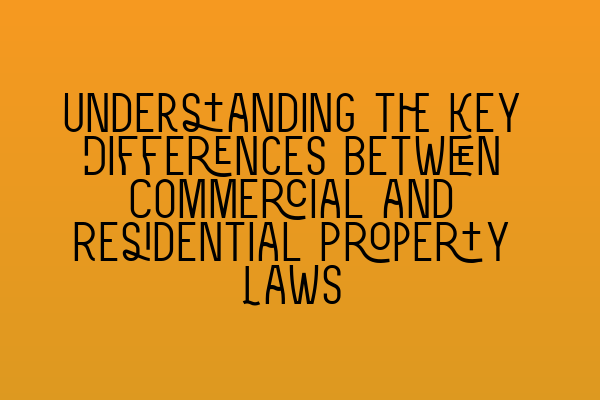Understanding the Key Differences between Commercial and Residential Property Laws
As a solicitor specializing in property law, it is crucial to have a comprehensive understanding of the differences between commercial and residential property laws. These two areas of law are distinct from each other, with each having its own unique set of rules, requirements, and considerations. In this article, we will explore the key differences between commercial and residential property laws, providing valuable insights for both legal professionals and property owners.
1. Purpose and Use
Perhaps the most significant difference between commercial and residential property laws lies in their purpose and use. Residential properties are primarily used for dwelling purposes, such as homes, apartments, and condominiums. On the other hand, commercial properties are intended for business-related activities, such as offices, retail stores, industrial spaces, and warehouses. It is important to note that certain properties, known as mixed-use properties, can have both residential and commercial components, and they are subject to a combination of rules from both areas of law.
2. Legal Frameworks
Commercial and residential property laws operate within distinct legal frameworks. Residential property laws are typically governed by local housing laws, which regulate various aspects of residential tenancies, landlord-tenant relationships, and property maintenance. Commercial property laws, on the other hand, are primarily shaped by contract law and business regulations. These laws are often more complex and extensive, as they cover a wide range of commercial transactions, leases, licenses, and property management.
3. Regulation and Zoning
Another key difference between commercial and residential property laws lies in their regulation and zoning requirements. Residential properties are subject to residential zoning, which designates specific areas for residential use and imposes restrictions on the types of activities that can be carried out. Commercial properties, on the other hand, are subject to commercial zoning, which allows for a wide range of business activities and may have fewer restrictions compared to residential areas. Understanding the zoning regulations is crucial when advising clients on property acquisitions or when resolving disputes related to land use.
4. Lease Agreements
Lease agreements in commercial and residential properties also differ significantly. Residential lease agreements are typically more standardized and heavily regulated to ensure tenant rights and protections. These leases often have fixed terms, such as one year, and provide tenants with certain legal rights, such as the right to habitable conditions and protection against unfair eviction. Commercial lease agreements, on the other hand, are highly negotiable and customizable, as they are tailored to suit the specific needs and requirements of the business. These leases often have longer terms, options for extensions, and provisions for various business-specific considerations.
5. Financial Considerations
Financial considerations are another important aspect where commercial and residential property laws diverge. Commercial properties generally involve higher transaction values, complex financing structures, and commercial lending arrangements. These transactions require in-depth knowledge of commercial financing, corporate law, and tax regulations. Residential properties, on the other hand, are usually financed through traditional residential mortgages and tend to have less intricate financial arrangements.
Conclusion
In conclusion, understanding the key differences between commercial and residential property laws is essential for solicitors specializing in property law. While residential properties are primarily used for dwelling purposes and subject to local housing regulations, commercial properties are used for business activities and governed by contract law and business regulations. The legal frameworks, regulation and zoning requirements, lease agreements, and financial considerations of these two areas of law vary significantly. As a solicitor, it is crucial to be well-versed in both commercial and residential property laws to provide effective legal advice and representation to clients.
Related Articles:
SQE 1 Practice Exam Questions
SQE 1 Practice Mocks FLK1 FLK2
SQE 2 Preparation Courses
SQE 1 Preparation Courses
SRA SQE Exam Dates
